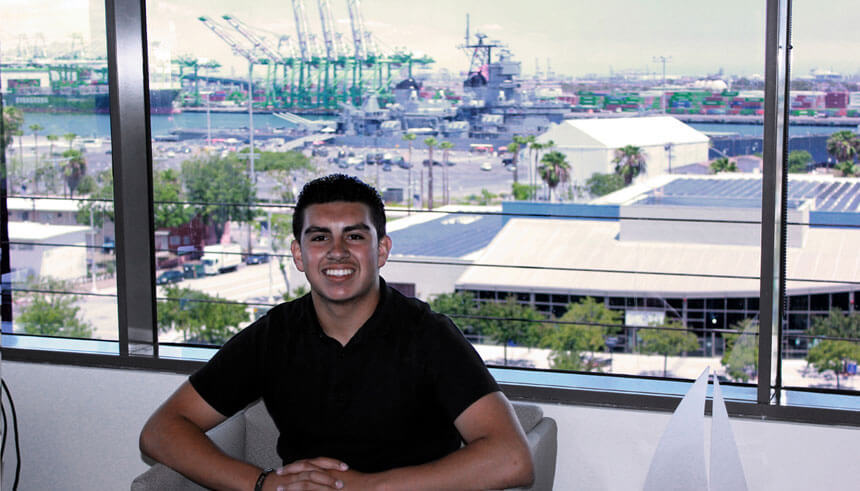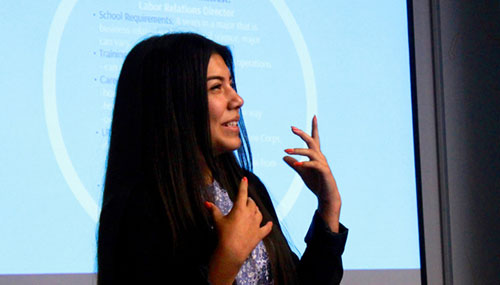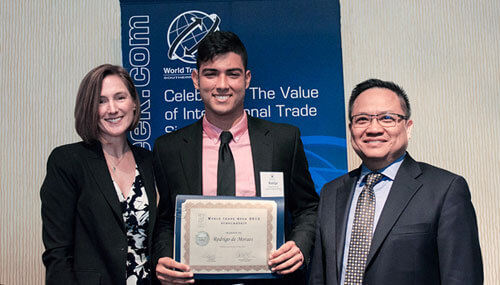Entrepreneur Insight
High School Students Learn the Ropes of Global Trade at Ports

Global trade desperately needs a pipeline of diverse and tech-savvy workers
“Initially, I really was not at all interested in global trade. I thought, ‘It’s such a dull subject.’ I have family that work down at the port as longshoremen, so I already kind of knew the basics of it, and I just kind of wrote off the whole global trade thing,” said high school student Jasmine McPherson.
Fellow high school student Nicolas Rojas echoed the sentiment: “I thought of global trade and logistics as just an industry. I didn’t really know much about it beyond the longshoremen, who are such a vital part of our community, and they kind of defined the port for me.”
Amy Grat, chief executive officer of the International Trade Education Programs (ITEP) has set out to change that impression and get a new generation excited about future opportunities. Both McPherson and Rojas are developing a new interest in the industry as ITEP interns at Ports America, the largest terminal operator in the country. “They’re right there in the shadow of the cranes at the port, but there had been a complete disconnect. They haven’t been to downtown L.A., they haven’t been to San Gabriel and tried the dim sum that could rival Shanghai‘s. It may be a function of socioeconomic challenges, but also I think there’s something quite isolating about adolescence and that’s why I think that programs like ITEP are helpful for any teenager” Grat said.

Each year interns work in different offices at the port, with companies like Ports America or even in congressional offices. Even before an internship, there are many touch points with the global trade and logistics industry and professional development. High school senior Juan Carlos Monroy interned in the Community Relations Division at the Port of Los Angeles, where he helped organize community events like the “Cars & Stripes” Fourth of July classic car show and the preparation for the Special Olympics. He felt that his experience was more interesting than the summer jobs that some of his friends had. “Outside of L.A., not many schools and kids have the opportunity to join this program and learn about this field.”
This summer, 98 students from the Los Angeles Unified School District and Long Beach Unified were placed in ITEP summer internships with 54 employers. “[At ITEP], we’re working with programs that, by definition, are serving at-risk youth. These are the kids that would have perhaps gotten lost on the way to graduation. They’re now graduating and they’re better prepared for the world of work than many kids in a college-prep program, or a magnet program, and I’ll stand by that,“ Grat said.
ITEP currently serves around 3,332 students enrolled across all their programs, logging about 12,000 volunteer hours annually. The organization then offers students eight to ten workshops throughout the entire junior year of high school, covering career readiness, including: how to write a résumé, dressing for success, customer service and mock interviews. Once students have completed all of these requirements, they have the opportunity to interview for a real paid internship. Grat explained that the internship is the game-changer. “We see the impact in graduation rates. The academies and pathways that we support have about an 85 percent graduation rate. But that 85 percent kicks up to 97 percent when the students are in the internship program,” Grat said.
Need for New Blood
The San Pedro Bay Port Complex, which includes the ports of Los Angeles and Long Beach, supports more than 1 million jobs throughout the five-county Southern California region, and the trade and logistics cluster is the largest traded industry cluster in Los Angeles County. This cluster is expected to grow from 138,800 jobs in 2014 to 150,000 jobs in 2019, according to the Los Angeles County Economic Development Corporation, and part of the aim of ITEP is to cut through the abstraction of global trade and introduce the range of available opportunities.
Monroy said, “I learned about the different kinds of roles that people play in the building. I find mechanical engineering most interesting.” Each of the ITEP interns talked enthusiastically about the range of opportunities.
“I’ve learned that global trade involves many different aspects. You have labor relations, you have human resources, you have tech and you have best practices—there are so many areas that you can branch off to. The environment’s so diverse; it really just opened my mind,” McPherson said.
This surge of fresh interest is timely because, according to Grat, logistics in Southern California has an aging population problem. “My typical mentor probably fell into the industry himself or herself, but they are recognizing today, if they are to backfill his or her position, they’re going to need to build the pipeline. I’ve talked to some of the railways and they talk about as many as 40 percent of their employees are coming up on retirement. There’s a need for new blood and technology is driving all the innovation. We need young, technically savvy people,” Grat said.

Part of attracting that youthful workforce will be demonstrating that global trade and logistics can offer the exciting jobs of tomorrow for those at home with emerging technologies. Rojas is optimistic about the changing state of the industry. “More will be done by machines in the future, but I think there will always be the need for a human touch. Because you need a human mind behind that, operating that, engineering that and creating that. I think that’s sort of what my generation is supposed to do. We have to engineer the beautiful ideas and the beautiful inventions that will help expedite the logistic processes of tomorrow,“ he said.
The Future
As global trade and logistics grapple with incorporating automation technology and effectively reaching a more diverse global market, ITEP is training the new generation to fill this need. Part of ITEP’s goal is to help students realize that people who can be connectors are in high demand. Not only people who can bring complex systems together, but also people who can serve as a bridge between different people and cultures. “One of the things that we don’t always consider in global trade is direct communication between people. We always talk about computers, but a crucial aspect of logistics is communication between two people,” Rojas said.
McPherson also came to realize the power of thoughtful communication among stakeholders through her internships in the labor relations department. “You get to communicate with so many different people, and you can help negotiate and help resolve issues and just make the process more efficient. That’s not only for the longshoremen, or management, but for the employers as well,” she said. With family in the industry and exposure at Ports America, McPherson is well aware of the shifting paradigm underway. “Well, being on the waterfront, I’ve taken some terminal tours and I know that, down in Long Beach, they’re currently working on opening a fully automated terminal called LBCT. The port is going to automate over the years which will lead to less demand for labor, but it will be more efficient overall. It’s going to cost much less and be a better way to transport the cargo.”
ITEP’s hard work is paying off: 17 students from Banning High School are currently enrolled in the California State University Maritime Academy, one of only seven degree-granting maritime academies in the United States. “Before ITEP, not a single student from Banning High School had ever attended California Maritime Academy,” Grat said. “Every single one of them is Hispanic. Some of them were born in another country, and I think half of them are women, and they are pioneers.”

Sign up for the Reach Further Newsletter
We’ll keep you in the know about the latest US-Asia business news and trends.
Suscríbase al boletín Reach Further
Lo mantendremos informado sobre las últimas noticias y tendencias comerciales entre Estados Unidos y China.

